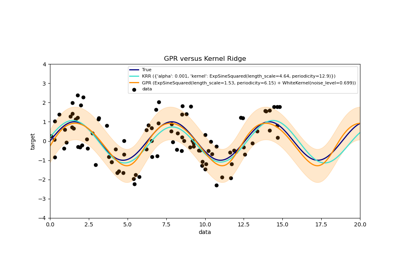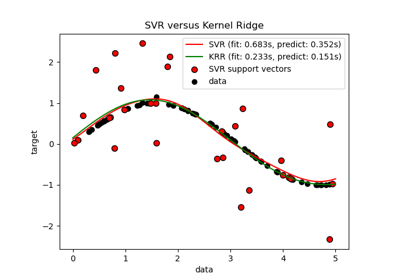sklearn.kernel_ridge.KernelRidge¶
-
class
sklearn.kernel_ridge.KernelRidge(alpha=1, *, kernel='linear', gamma=None, degree=3, coef0=1, kernel_params=None)[source]¶ Kernel ridge regression.
Kernel ridge regression (KRR) combines ridge regression (linear least squares with l2-norm regularization) with the kernel trick. It thus learns a linear function in the space induced by the respective kernel and the data. For non-linear kernels, this corresponds to a non-linear function in the original space.
The form of the model learned by KRR is identical to support vector regression (SVR). However, different loss functions are used: KRR uses squared error loss while support vector regression uses epsilon-insensitive loss, both combined with l2 regularization. In contrast to SVR, fitting a KRR model can be done in closed-form and is typically faster for medium-sized datasets. On the other hand, the learned model is non-sparse and thus slower than SVR, which learns a sparse model for epsilon > 0, at prediction-time.
This estimator has built-in support for multi-variate regression (i.e., when y is a 2d-array of shape [n_samples, n_targets]).
Read more in the User Guide.
- Parameters
- alphafloat or array-like of shape (n_targets,), default=1.0
Regularization strength; must be a positive float. Regularization improves the conditioning of the problem and reduces the variance of the estimates. Larger values specify stronger regularization. Alpha corresponds to
1 / (2C)in other linear models such asLogisticRegressionorLinearSVC. If an array is passed, penalties are assumed to be specific to the targets. Hence they must correspond in number. See Ridge regression and classification for formula.- kernelstring or callable, default=”linear”
Kernel mapping used internally. This parameter is directly passed to
pairwise_kernel. Ifkernelis a string, it must be one of the metrics inpairwise.PAIRWISE_KERNEL_FUNCTIONS. Ifkernelis “precomputed”, X is assumed to be a kernel matrix. Alternatively, ifkernelis a callable function, it is called on each pair of instances (rows) and the resulting value recorded. The callable should take two rows from X as input and return the corresponding kernel value as a single number. This means that callables fromsklearn.metrics.pairwiseare not allowed, as they operate on matrices, not single samples. Use the string identifying the kernel instead.- gammafloat, default=None
Gamma parameter for the RBF, laplacian, polynomial, exponential chi2 and sigmoid kernels. Interpretation of the default value is left to the kernel; see the documentation for sklearn.metrics.pairwise. Ignored by other kernels.
- degreefloat, default=3
Degree of the polynomial kernel. Ignored by other kernels.
- coef0float, default=1
Zero coefficient for polynomial and sigmoid kernels. Ignored by other kernels.
- kernel_paramsmapping of string to any, default=None
Additional parameters (keyword arguments) for kernel function passed as callable object.
- Attributes
- dual_coef_ndarray of shape (n_samples,) or (n_samples, n_targets)
Representation of weight vector(s) in kernel space
- X_fit_{ndarray, sparse matrix} of shape (n_samples, n_features)
Training data, which is also required for prediction. If kernel == “precomputed” this is instead the precomputed training matrix, of shape (n_samples, n_samples).
See also
sklearn.linear_model.RidgeLinear ridge regression.
sklearn.svm.SVRSupport Vector Regression implemented using libsvm.
References
Kevin P. Murphy “Machine Learning: A Probabilistic Perspective”, The MIT Press chapter 14.4.3, pp. 492-493
Examples
>>> from sklearn.kernel_ridge import KernelRidge >>> import numpy as np >>> n_samples, n_features = 10, 5 >>> rng = np.random.RandomState(0) >>> y = rng.randn(n_samples) >>> X = rng.randn(n_samples, n_features) >>> clf = KernelRidge(alpha=1.0) >>> clf.fit(X, y) KernelRidge(alpha=1.0)
Methods
fit(X, y[, sample_weight])Fit Kernel Ridge regression model
get_params([deep])Get parameters for this estimator.
predict(X)Predict using the kernel ridge model
score(X, y[, sample_weight])Return the coefficient of determination \(R^2\) of the prediction.
set_params(**params)Set the parameters of this estimator.
-
fit(X, y, sample_weight=None)[source]¶ Fit Kernel Ridge regression model
- Parameters
- X{array-like, sparse matrix} of shape (n_samples, n_features)
Training data. If kernel == “precomputed” this is instead a precomputed kernel matrix, of shape (n_samples, n_samples).
- yarray-like of shape (n_samples,) or (n_samples, n_targets)
Target values
- sample_weightfloat or array-like of shape (n_samples,), default=None
Individual weights for each sample, ignored if None is passed.
- Returns
- selfreturns an instance of self.
-
get_params(deep=True)[source]¶ Get parameters for this estimator.
- Parameters
- deepbool, default=True
If True, will return the parameters for this estimator and contained subobjects that are estimators.
- Returns
- paramsdict
Parameter names mapped to their values.
-
predict(X)[source]¶ Predict using the kernel ridge model
- Parameters
- X{array-like, sparse matrix} of shape (n_samples, n_features)
Samples. If kernel == “precomputed” this is instead a precomputed kernel matrix, shape = [n_samples, n_samples_fitted], where n_samples_fitted is the number of samples used in the fitting for this estimator.
- Returns
- Cndarray of shape (n_samples,) or (n_samples, n_targets)
Returns predicted values.
-
score(X, y, sample_weight=None)[source]¶ Return the coefficient of determination \(R^2\) of the prediction.
The coefficient \(R^2\) is defined as \((1 - \frac{u}{v})\), where \(u\) is the residual sum of squares
((y_true - y_pred) ** 2).sum()and \(v\) is the total sum of squares((y_true - y_true.mean()) ** 2).sum(). The best possible score is 1.0 and it can be negative (because the model can be arbitrarily worse). A constant model that always predicts the expected value ofy, disregarding the input features, would get a \(R^2\) score of 0.0.- Parameters
- Xarray-like of shape (n_samples, n_features)
Test samples. For some estimators this may be a precomputed kernel matrix or a list of generic objects instead with shape
(n_samples, n_samples_fitted), wheren_samples_fittedis the number of samples used in the fitting for the estimator.- yarray-like of shape (n_samples,) or (n_samples, n_outputs)
True values for
X.- sample_weightarray-like of shape (n_samples,), default=None
Sample weights.
- Returns
- scorefloat
\(R^2\) of
self.predict(X)wrt.y.
Notes
The \(R^2\) score used when calling
scoreon a regressor usesmultioutput='uniform_average'from version 0.23 to keep consistent with default value ofr2_score. This influences thescoremethod of all the multioutput regressors (except forMultiOutputRegressor).
-
set_params(**params)[source]¶ Set the parameters of this estimator.
The method works on simple estimators as well as on nested objects (such as
Pipeline). The latter have parameters of the form<component>__<parameter>so that it’s possible to update each component of a nested object.- Parameters
- **paramsdict
Estimator parameters.
- Returns
- selfestimator instance
Estimator instance.


